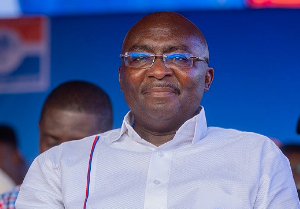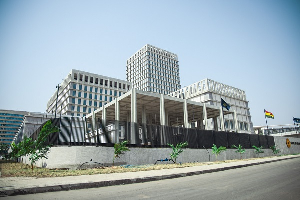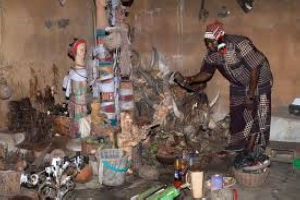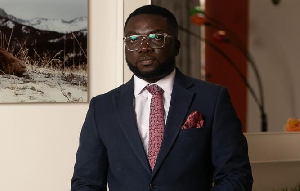By Sundong Abdul-Korah
RECENTLY, the Daily Graphic (Tuesday, May 26, 2009, pp 20) reported that only two out of the nine medical doctors posted to the Upper West Region [UWR] last year reported for duty. “For this reason, only six doctors are manning all the health facilities in the nine districts and the regional hospital.” I cannot but congratulate the reporters for their ingenuity and the Daily Graphic for making public this sea of disbelief. Perhaps another editorial conference could pass this as a front-page story.
Without any controversy, there exist a perfect positive correlation between the health of nationals and productivity. Europe’s remarkable development in the 19th century and more recently in the developing countries of Asia and parts of Latin America could not have been without significant improvements in the health status of citizens. Yet the doctor-patient ratio in the Youngest Region in Ghana is estimated at 1: 91,083 as against the national ratio of 1:13,000. What a reckless tragedy! What a magnificent misfortune in our democratic society whose loyal inhabitants have established virtually no respect for law; whose reasoning is becoming but the ravings of mad persons; and who spend the seventh day as though their gods were dead.
1977. Kaleo Local Authority middle school. Our teacher, a prototype of laziness, had repeated her usual dosage by failing to turn up. Then a bully called Doctor left his classroom and darted straight to my desk, hysterically pulled me off my books, raised me high only to toss me into the air. I tumbled headlong onto the concrete floor, waking up with a broken mouth, my teeth terribly crashed. Unfortunately, there was no dentist in any corner in the then Upper Region at the time to attend to me. Three decades have elapsed and there has since not been any dentist practicing in the UWR, even today.
While at home barely a year now, we rushed a young mother to the Nadowli District Hospital only to meet a Cuban woman (the only medical Officer) in the midst of teaming and screaming patients. Her Ghanaian counterpart, frustrated over some alleged irregularities on the part of officials of the District Assembly, we were told, had packed bag and baggage. Another two days and mourners gathered in our home and shrieked convulsively. Grace, may the Lord’s grace rest upon your soul.
Last April I paid several visits to a distressed Youngman at the Korle-Bu Teaching Hospital. He was referred along with a Chinese construction engineer who fell off a height in the UWR. Airlifted with a limb already severed, Banabas lay with the other healthy limb constantly but inadvertently folded; an apparent attempt to avoid feeling the sudden void in the shortened leg. Specialists at KBTH who attended to him wondered, seriously probing relatives why his leg was severed with such earthquake suddenness. “Doctors told us that we might lose him if the affected leg was not chopped off immediately,” a relative explained. But with only skeletal staff, already overworked, with few or no specialists, and in the thick of urgent cases including accidents amidst varied logistics constraints, what else should we expect other than more clutches and coffins? The 26-year old professional driver, now unemployed and unemployable until he learns a new trade, is struggling to cope with his colossal misfortune. The number of referral cases from the three distant regions to either KATH or KBTH is voluminous, but those who fail to report (because they are incapable) are even more and their plight more traumatizing. I have no doubt there’re worse scenarios than many of us can imagine. For sure, the health needs of some rural and peri-urban communities are in critical stages, perhaps exacerbated by the good-natured NHIS, and require drastic interventions. The three regions comprising the Northern Sector of the country with an estimated handsome doctor-patient ratio of 1: 95, 500 are lumped up as the worst affected; also with the least paramedical staff including pharmacists, who, together with some medical doctors, are ready and eager to relocate elsewhere.
Now I dare ask: These fine gentlemen with stethoscopes dangling around their chest like the Holy crucifix on the necks of committed Roman Catholic Monks and Nuns, yet who willfully defy postings to deprived communities, what alternatives do they think are left to their fellow citizens out there, who, unfortunately, are also laden with poverty and certainly more prone to diseases? Have they, in the deeper layers of consciousness, ever pondered over the miseries their decisions have heaped upon others? Can they support their actions with good and serious reasons? I find it prudent to ask yet once more: Are contemporary medical practitioners more interested in Wealth than in Health? Are pious prelates in our yard more interested in preaching the sermon than in guiding their flock to God? As one traverses this great nation --- from Banku region through Kenkey and Fufu regions to Tuozafi region--- one cannot but wonder what potent dosage can cure this contagious disease that runs swiftly in our healthy veins, swaying decent minds from decency and sympathy to the detriment of poor citizens, and perhaps to themselves too. Why do sane professionals, witty public and civil servants continue to defy postings and resist transfers whilst preferring and clinging onto certain parts of the country to the sheer neglect of other important areas where their services are needed most? Former President Kuffuor once claimed that the UWR capital Wa was too far. Shouldn’t I dare ask? Is Ghana far from itself? Are humble citizens being ill-advised by friends, lovers and pious parents? Ironically and unashamedly, these same proud professionals and workers have not on any single occasion rejected produce-- yam, groundnuts, cattle, goats, guinea fowls, smocks etc from deprived communities such as the Upper West Region (UWR). Certainly not their services too!
Increasingly, parents have been investing heavily on their wards; sometimes even compelled to contract loans from Shylocks just to ensure that they complete their courses successfully. As final year medical students are preparing for further studies abroad, parents are making frantic efforts to finance their travel and miscellaneous expenses. Understandably, they have every reason to worry over the postings of their sons and daughters. But if every professional decides to serve in a location of his/her choice (granted that the facilities exist), how chaotic our system will become. In fact, our nation will cease to be a true Republic but a caricature notion. We must commend President Nkrumah for his foresight and triumphant defeat of the proponents of federalism in Ghana. Under federalism, the mirror may have rejected even pretty images; our wounds would have enlargened!
Those six doctors and their faithful predecessors who refused postings to the UWR region, and others who for two consecutive years also denied the people of the UER as well as other pitiful communities their services, just where are they practicing now? Who manipulated procedures, and for what satisfactory reasons were they reposted? And who pays them? I suggest that the GHS should begin to publish such names in the dailies as this may help. The decision by the GHS to only advertise for vacancies for newly trained doctors for the three northern regions this year is reasonably assuring, but perhaps long overdue. If we ever fail to remember our very essence, at least, let’s remember President Kennedy’s famous statement: “Ask not what your country can do for you; ask what you can do for your country.”
An eighteenth-century minister, Humphrey Primatt, wrote ironically that in the case of aged and infirm animals “God, the Father of Mercies, hath ordained Beasts and Birds of Prey to do that distressed creature the kindness to relieve him his misery, by putting him to death.” A kindness (euthanasia?) we human beings dare not extend to our own kind. For what reason(s) then should we deliberately abandon some sick people who lay in wait for the last breath when they are crushed with the weight of their own misery? Just as the Prophets of the Eighth century B. C. left their villages and carried their “thus saith the Lord” far beyond the boundaries of their home towns, and just as the Apostle Paul left his village of Tarsus and carried the gospel of Jesus Christ to the far corners of Greco-Roman world, so should we be obedient, merciful and daring enough to carry the gospel of health and love beyond our home towns. Like Paul, like Dr Nugochi and Dr Archibald (Sambo) of Jirapa Hospital fame, we should constantly respond to the merciful Macedonian call for aid. “Those who cannot remember the past are condemned to repeat it,” George Santayana admonishes us.
Undeniably, something is fundamentally wrong in our dear democratic nation. It’s common knowledge that politicians and influential people often meddle and dabble in many orderly institutional procedures including transfers and postings. The consequences of these sordid manipulations, as we continue to see or suffer with each passing day, are quite nauseating and certainly devalues the honour bestowed on these high-echelon citizens.
Again, the present bourgeois political landscape dazzling before us has dazzled the rest of our society. It has become apparent everywhere that the present generation lacks the strength and spirit which enabled previous generations to win, in painful struggle and at great sacrifice, the socio-political and economic emancipation of mankind. Current trends like the deprivation of a whole zone amidst grave graft among public officials bring only unimmaginable sorrow, which no doubt will remind our progeny the recklessness of its ancestors. So what our troubled continent is currently experiencing is a clear manifestation of weakness of character and lack of responsibility on the part of the leaders in our sovereigns, and of shortsighted selfishness of particularly the elite and the privileged who willfully decline angelic missions for personal gains. Who knows how many Einsteins and Nkrumahs we might have lost as a result of our unpatriotic disposition? Many of us have unknowingly turned down God’s call and hastened to commit sacrilege by answering Sunday bells in such baffling and exasperation comportment.
Nonetheless, the present predicament of the people of the UWR and neighbouring disadvantaged communities are as a result of a complex web of factors, some historical.
The colonial government’s decision to bar the inhabitants of the Northern Territories as well as those of the Northern Section of Togoland from attending the few secondary schools in the Gold Coat Colony, secluding and preserving them for cheap labour in the mines and cocoa farms as well as the security services merely account for the current disparate disparities in education, health and general development across the country.
This perfect condescension and determined deprivation of the northern people would make Kimble wince: “Since 1901 the Northern Territories had been legally as well as territorially attached to Gold Coast, their trade had been directed towards the sea rather than the desert, they had been governed at least on paper from Accra, and they became subject to a similar pattern of British influence. Yet the northern peoples remained physically and psychologically remote, they were in the Gold Coast and yet not of it.”
From Adam to atom, the burdens and plagues of the world have been truly and increasingly awesome, yet often artificially generated. With so many surpluses in many parts of the globe, scores of millions are experiencing extreme hunger and poverty. The present afflictions of many communities in Ghana are as a result of gross injustice and inequalities in our little garden: Obviously, health and education indicators tend to be highly correlated with income per capita. Almost half of the preventable deaths of under-fives in developing countries are as the result of malaria, diarrhea and respiratory illnesses, worsened by malnutrition. All of this could be cost-effectively dealt with through preventive measures at lower-level facilities. Unfortunately, priorities in urban centres are often overwhelming.
Santosh Mehrotra decries that in some developing countries a single teaching hospital at the top of the pyramid can take 20 percent or more of the government’s health budget. This leads to both inefficiency and inequity. And it leads more to rural neglect. Yet in Ghana majority of medical practitioners work in the two largest cities of Accra and Kumasi. Should we be reminded that the deprivation of the poor isn’t just poverty but murder? Should we be reminded that an epidemic like swine flu in a neglected community may not neglect neighbouring metropolitan communities? Happily, fertile minds have consistently sought the beauty and comfort of humanity, and Kwame Nkrumah’s affirmative action in the northern sector of the country brought colossal dividends at many fronts and fields of endeavour. The region may be destitute of minerals, timber and other natural resources of trade value—the very deficiencies that incurred the wrath of the exploitative colonialist--but it is not destitute of skilled labour. Over the last few decades, there has been an appreciable rise in the number and range of professionals from northern Ghana, from geology to cinema, including of course, medical practitioners.
Medical doctors who double as consultants/lecturers at KBTH from the UWR include Prof Simon Naeder, past Deputy Provost of the College of Health Sciences and a Consultant Surgeon of the surgical department, Dr Thomas K. Dakurah (Consultant Neuro-Surgeon and Head of the Neuro-Surgery Department), Dr Ali Samba (Consultant Gyaenacologist), Dr Jonathan Dakubo (Consultant Surgeon) and Dr Alhassan Jangu (ENT Specialist). At the Komfo-Anokye Teaching Hospital Dr Andah Nacole, Dr. Ernest Kunfaa Ngmen-Ib and others are imparting knowledge and restoring the health of patients.
Others are Dr. Phillibert Kuuzume (Medical Officer) and Dr E. N. Delle of Rabito clinic, a well-known consultant dermatologist. Until his retirement last year Dr Boniface Domakyaare was the Principal Medical Officer of the Castle Polyclinic and one time the Metropolitan Health Director. Dr E’ru E. Der of the Ridge Hospital fame is now specializing in Pathology at the UGMS.
When Dr Alexis Nang-Beifubah was serving in the Presbyterian Hospital in Bawku a few years back, he was there with Dr John Tampoure and Dr Callistus who is currently an orthopedic surgeon at the Tamale Teaching Hospital (TTH). Neither was Dr Elais Sory in Bolgatanga Regional Hospital alone; his brother, Dr John Mwinyogle (now in South Africa) was serving along with him. Today the list is indeed tall, including young medical officers such as Maj Richard Naab, Maj Thomas Gbere, Maj Sheila Dery and Lt-Col Andrews Kanminta (Radiologist) all currently serving at the 37 military Hospital. There are many other young doctors from the UWR practicing in many hospitals scattered across the country. See appendix. Dr Alexis Nang-Beifubah’s assertion that there are limited opportunities for the development of young doctors serving in the UWR because there are few specialists around to teach them is rather sad. Those who know laborious Sir Dr Edward Gyader (consultant surgeon and Dean, SMAHS, UDS) must forever appreciate his selfless dedication to his people. Young men like Dr Albert Paintsil (now a consultant plastic surgeon and Head of Plastic Surgery, KBTH) found reason to practice under him at the Wa Hospital for five years. A timely leverage from his early colleagues could offer more hope to the hopeless as many other young doctors may have been attracted to understudy them. May some of these young specialists from the region follow not Dr Gyader’s shadow but his giant positive footsteps. But most importantly, the TTH must be equipped in time along with the upgrading of the Wa and Bolgatanga regional hospitals to attract specialists.Whilst we urge doctors from the region not to turn a blind eye to their distressed parents and relatives at home, we humbly appeal to their colleagues from other parts of the country to share their professional skills with least served communities. After all, regional boundaries aren’t national boundaries. Anyone who lives inside Ghana can never be considered an outsider anywhere within its bounds. Hence the shadow of deep disappointment shouldn’t be allowed to settle upon fellow citizens. That’s why Dr Francis Ali from the UWR didn’t decline but hopped from Drobo through Salaga to Walewale where he serves as the District Medical Director.The famous pot whose contents soothe the thirsty should have its dry outside also watered by others. People like Dr Jacob Abebrese from B/A, who is currently the Medical Director of the Wa Regional Hospital deserve congratulations. Nonetheless, when a firefighter’s house catches fire and his colleagues are reluctant to help, it only behooves him to double and quicken his efforts. For this is the only way to provoke reason and sympathy in the minds of the defiant defaulters; this is the best way to shame the apathetic. My unhesitant congratulations Dr Sebastian Sandaare and Dr Valentine Nofong of the Nadowli and Tumu Hospitals respectively! In order to attain a level of equity across the board some poverty reduction strategies will have to be adopted. Lamentably, it is an historical fact that privileged groups seldom give up their privileges voluntarily. The notion of ‘partnership’ between poor and non-poor groups acknowledges the need to involve powerful non-poor groups such as the business community, political and community leaders in a joint effort to promote poverty-reducing interventions. However, the idea of partnership is presented within a model of harmony, as if the non-poor had the same interest in poverty reduction as the poor. The notion of vested interests and conflict of interests is played down in an attempt to be diplomatic. But it remains unchallenged that those in luxury are often not ready to part some of their privileges for the betterment of the underprivileged. Moreover, Reinhold Niebuhr cautions that groups tend to be more immoral than individuals. We’re living witnesses to escalating mob’s gruesome justice. For this reason, we can only count on the moral conscience of individual doctors to strengthen their faith and to reject any mischievous misinformation that the Northern sector is far less habitable. Bravo our Cuban friends who are scattered all over in surgical gloves! In spite of the above, it’s equally imperative for the various Metropolitan, Municipal and District Assemblies, as Dr Nang-Beifubah has recommended, to be more assertive and proactive by redirecting their efforts toward the welfare of those who practice in the Northern regions including sponsoring medical students so that they may have no reason to stay away but come back and serve their people upon completion. In the face of expanding internet facilities and telecommunication gadgets, it’s regrettable that there are still delays in information flow on crucial issues such as training opportunities/programmes to the UWR.I entreat the Ghana Health Services (GHS), Ministry of Health (MOH) and other stakeholders to gather momentum and fix this as soon as practicable. By this, I am also prompting the experienced ears of young Haruna Iddrisu, Minister for Communications, to facilitate such critical matters. As one people it will help us a great deal if we come to the realization that whatever our career and no matter where we reside, our task should always be to try and reach out to others so that life may be more meaningful and rewarding to ourselves and our immediate communities. Agathon couldn’t have put it more eloquently: “This only is denied to God: the power to undo the past.” Hence let’s do the right thing right now. The celebrated Scientist and philosopher, Albert Einstein, poignantly points out that the individual has become more conscious than ever of his dependence upon society. “But he does not experience this dependence as a positive asset, as an organic tie, as a protective force, but rather as a threat to his natural right, or even to his economic existence…. Man [Woman] can find meaning in life, short and perilous as it is, only through devoting himself to society”. The duty of society is to protect the robbed and punish the robber. Now is the time to make real the promise of democracy and transform our current national imbalances into fairly acceptable levels of development across the hinterland. Intelligent minds contend that current trends of our educational system suffer the evil of capitalism which often strangulates the individual. “An exaggerated competitive attitude is inculcated into the student,” one argues, “who is trained to worship acquisitive success as a preparation for his future career.” It’s for this reason that workers defy postings and transfers while others offer bribes to be posted to particular stations where they think they can benefit most. Yet others abandon the very people who nurtured them into useful maturity for greener pastures abroad only to return and meet their parents’ pitiful tombs. The 2006 World Health Report estimates that Africa and Asia together lack more than 4 million health workers as a result of brain-drain. The WHO-sponsored Global Health Work Alliance estimates that 1 in 4 doctors and 1 in 20 nurses will leave Africa to pursue higher-paying jobs abroad. The attrition rate among health professionals in Ghana has been estimated at 3.7% for doctors, 0.07% for pharmacists and 4.2% for professional nurses and midwives. It is further estimated that 60% of trained Ghanaian doctors work outside the country. This cash-for-cemetery tendency is indeed troubling, especially in the wake of significant improvements in the conditions of service for health professionals over the last few years. Once more I commend Dr Kwame Danso for returning home to establish a state-of-the-art Ghana-Canada Medical Centre. Thus a socialist economy is prescribed along with an educational system oriented toward social goals. It’s believed this may help eliminate these grave evils. “The education of the individual, in addition to promoting his own innate abilities, would attempt to develop in him a sense of responsibility for his fellow men in place of the glorification of power and success in our present society,” Einstein further advises. Thoroughly devastated by the world’s agonizing weirdness, a hard-edged scientist once questioned why his colleagues were so deeply opposed to the disappearance of the Human Race. The sage did not only lose the confidence and beauty of society but had painfully lost inner equilibrium. Should our world be allowed to be so fraught with such deep disappointment? No. It therefore behooves us, but more especially those who have the means and power to prevent fellow citizens from questioning the very meaning of their lives, to apply full leverage. For anyone who has been blessed with creative idea or curative power to relieve suffering shouldn’t wait for praises because his or her very accomplishments would confer upon him/her the honours of a saint. Let’s reorient ourselves toward service and help for the larger community no matter the constraints. And once we recognize this path that leads to heaven, we must endeavour to pursue it without compromise and with extreme tenacity. If the bourgeoning cemeteries in the three regions in the Northern sector and elsewhere are to take leave of their prolonged undeserving feasts, then together we must begin to build bridges of commonality and solidarity. The era which evoked only mere empathy and sympathy for the disadvantaged is over; this is the time to show concrete affection to those who are constantly awakened to pain and buried in unceasing humiliation. Perhaps this is the most ideal time for Government to implement the long-awaited call for attractive packages for health workers serving in least served communities. The GHS and MOH shouldn’t delay in emulating the Ghana Education Service (GES) intended package(s) to lessen the burden and therefore boost the morale of teachers in rural areas. In his celebrated Letter from Birmingham Jail, Dr. Martin Luther King Jr reminds us that shallow understanding from people of goodwill is more frustrating than absolute misunderstanding from people of ill-will. “Lukewarm acceptance [offer] is much more bewildering than outright rejection.” Hence the Savanna Accelerated Development Authority (SADA) initiated by the ruling NDC Government which aims at mass poverty reductions and radical improvements in the livelihoods of multitudes in the three northern regions and some parts of Brong-Ahafo and Volta regions mustn’t only take off soonest but shouldn’t fail to shoot the silver bullet. I still remember vividly the historic visit by some Paramount chiefs from the UWR to President J. J. Rawlings at the castle, Osu. They had come with a humble plea for the reconstruction of the rocky Bole-Bamboi road that used to knock out the ‘hearts and eyes’ of passing vehicles. His Excellency politely but shrewdly explained to the distressed dignified visitors that it was essentially because of such beleaguered afflictions that he appointed their very son, Kojo Salia [peace be upon him] as the Minister for Roads and Transport. Thankfully, the Director-General of GHS, Dr Elais Sory, and the Deputy Minister of MOH, Dr. Benjamin Kombour (PhD), are certainly heavy weights in the health sector. We humbly appeal (remind?) to them to actively and effectively represent the people of the UWR where their umbilical cords lie buried. And to my desolate people in desperation, yet amazingly cheerful and hardworking, I leave you not alone but with Cardinal F. Spellman: “Pray as if everything depended upon God and work as if everything depended upon man.” korahsun@yahoo.co.uk SOME MEDICAL DOCTORS FROM THE UWR 1. Dr Augustine Kabiri (Tamale, retired) 2. Dr Alhassan Mumuni (Tamale, Retired) 3. Dr Charles B. Sogfah (Kumasi) 4. Dr Boniface Domakyaareh (Accra, Retired) 5. Prof Simon Naeder (surgical Consultant, Provost UGMS) 6. Sir Dr Edward Gyader (consultant surgeon, Dean SMAHS, UDS) 7. Dr Thomas K. Dakurah (Consultant Neuro-surgeon, KTH) 8. Dr Ali Sambo (Consultant Gyaenacologist, KTH) 9. Dr Jonathan Dakubo (Consultant Surgeon, KTH)). 10. Dr Alhassan Jangu (ENT Specialist, KTH) 11. Dr Callistus (Orthopedic surgeon, TTH). 12. Dr Andrews A. Nacole (Anesthetist, KATH) 13. Dr Edmond. N. Delle (consultant dermatologist, Rabito clinic) 14. Dr Juventus Ziem (TTH) 15. Dr E’ru Edmund Der (Resident Medic, Pathology, KTH) 16. Dr Alexis Nang-Beifubah (Regional MD, UWR) 17. Dr John Tampoure 18. Dr Elais Sory (D-G, GHS) 19. Dr Naa Banka (Wa) 20. Dr John Mwinyogle (SA), 21. Dr. Phillibert Kuuzume (KTH) 22. Major Richard Naab (37 M Hosp) 23. Major Andrews Kanminta (Radiologist,37 M Hospital) 24. Dr Sebastian Sandaare (Nadowli District Hospital) 25. Dr Gabriel Dakubo (Canada) 26. Dr Methodius Tuuli (USA) 27. Dr Thomas Gbireh (37 military) 28. Dr Lwrence Kankpeyeng (Tamale) 29. Dr Crusantus Kubio (DMD-Damango) 30. Dr Baba Liman (USA?) 31. Dr Jacob Yangyuor () 32. Dr Allan Tiere () 33. Dr Gandao (Gyaenacoloist, TTH) 34. Dr Mornah (ask Sory/Dakurah) 35. Dr Alex Ire (Bimbilla) 36. Dr Balog Sibire (Wenchi Methodist Hospital) 37. Dr Francis Tintani (Accra) 38. Dr Tamburu 39. Dr Ali Francis (DMD, Walewale Hosp 40. Dr Joseph Nyuzagle (Damango) 41. Dr Vilentine Nofong (k’bu) 42. Dr Edward Yenle (KATH) 43. Dr Emmanuel Nachelle (VR) 44. Dr Sheilla Dery (37 M Hosp) 45. Dr Zakpa (Police Hosp) 46. Dr Felix Kuseg (USA) 47. Dr Gordon Donnir (Pantang Hosp) 48. Dr Edward Dasaah (KATH) 49. Dr Steve Kpangkpare (Asankarigua Hosp) 50. Dr Alan Tertor (Techiman Hosp) 51. Dr Alexis Bona-Im (Techiman Hosp) 52. Dr Habib Saanoon (37 M Hosp) 53. Dr Charekpong/Pydiatic (KTH) 54. Dr Fulgence Sangberder (Accra) 55. Dr. Fulgence (Sunyani) 56. Dr. Ernest Kunfaa Ngmen-Ib(KATH)
References Amartya Sen, 1992. Inequalities Reexamined: Harvard, NY Bening R. Bangulo, 2005. University of Development Studies in the History of Higher Education in Ghana: Hish Tahawah Publications, Accra. Bening R. Bangulo, 2002.Regional Boundaries and National Integration: UG, Legon Cardinal F Spellman: Daily Graphic,Tuesday, May 26, 2009, pp 20, Accra Ibid June 29, 2009 pp Dumont, Rene, 1963. False Start in Africa. Humphrey Primatt in Timothy W Crusius & Carolyn E Channell (Ed) Karl E. Scheibe, 2000 .The Drama of Everyday Life: Harvard, NY Kennedy John, in Timothy W Crusius & Carolyn E Channell (Ed) Kimble, David. In Bening R. Bangulo, 2005. University of Development Studies in the History of Higher Education in Ghana. Hish Tahawah Publications, Accra. MacKinnon Katherine, 2000. Only Words: Harvard, NY Martin Luther King Jr: Letter from Birmingham Jail inTimothy W Crusius & Carolyn E Channell (Ed) McCoy F. Remigius, M.Afr with Rene Dionne, M.Afr, 1988. Great Things Happen. A Personal Memoir of the first Christian Missionary among the Dagaabas and Sissalas of Northwest Ghana. The Society of Missionaries of Africa, Montreal, Canada Miller David, 1999. Principles of Social Justice: Harvard, Massachusetts National Democratic Congress (NDC) Party 20008 Manifesto Oyen M. et al, 2002. Best Practices in Poverty Reduction: An analytical Framework, Zed Books London-NY Reinhold Niebuhr in Timothy W Crusius & Carolyn E Channell (Ed): Santayana George Santosh Mehrotra Teresa, Mother, 1975. A Gift from God: Harper and Row: NY Timothy W Crusius & Carolyn E Channell (Ed): The Aims of Arguments: A Rhetoric and Reader. 2000. Third Ed. Mayfield Publishing Company, Mountain View. CA
The author is a graduate of NAFTI where he specialized in Television Production. He has practiced in some media houses including Ghana Television and Kencity Media Ltd but is now an independent filmmaker and writer. His collection of poems entitled ‘Decades of Decay’ is forthcoming.
Opinions of Friday, 4 September 2009
Columnist: Abdul-Korah, Sundong














